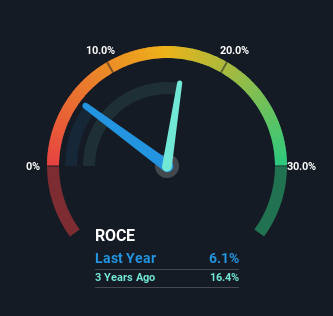Returns On Capital Signal Tricky Times Ahead For DMCC Speciality Chemicals (NSE:DMCC)

If you're looking for a multi-bagger, there's a few things to keep an eye out for. Ideally, a business will show two trends; firstly a growing return on capital employed (ROCE) and secondly, an increasing amount of capital employed. Basically this means that a company has profitable initiatives that it can continue to reinvest in, which is a trait of a compounding machine. Having said that, from a first glance at DMCC Speciality Chemicals (NSE:DMCC) we aren't jumping out of our chairs at how returns are trending, but let's have a deeper look.
Return On Capital Employed (ROCE): What Is It?
For those who don't know, ROCE is a measure of a company's yearly pre-tax profit (its return), relative to the capital employed in the business. To calculate this metric for DMCC Speciality Chemicals, this is the formula:
Return on Capital Employed = Earnings Before Interest and Tax (EBIT) ÷ (Total Assets - Current Liabilities)
0.061 = ₹163m ÷ (₹4.0b - ₹1.3b) (Based on the trailing twelve months to March 2023).
So, DMCC Speciality Chemicals has an ROCE of 6.1%. In absolute terms, that's a low return and it also under-performs the Chemicals industry average of 15%.
See our latest analysis for DMCC Speciality Chemicals

While the past is not representative of the future, it can be helpful to know how a company has performed historically, which is why we have this chart above. If you want to delve into the historical earnings, revenue and cash flow of DMCC Speciality Chemicals, check out these free graphs here.
What Can We Tell From DMCC Speciality Chemicals' ROCE Trend?
In terms of DMCC Speciality Chemicals' historical ROCE movements, the trend isn't fantastic. To be more specific, ROCE has fallen from 19% over the last five years. Although, given both revenue and the amount of assets employed in the business have increased, it could suggest the company is investing in growth, and the extra capital has led to a short-term reduction in ROCE. And if the increased capital generates additional returns, the business, and thus shareholders, will benefit in the long run.
In Conclusion...
In summary, despite lower returns in the short term, we're encouraged to see that DMCC Speciality Chemicals is reinvesting for growth and has higher sales as a result. These trends don't appear to have influenced returns though, because the total return from the stock has been mostly flat over the last year. So we think it'd be worthwhile to look further into this stock given the trends look encouraging.
DMCC Speciality Chemicals does have some risks, we noticed 3 warning signs (and 1 which is concerning) we think you should know about.
While DMCC Speciality Chemicals isn't earning the highest return, check out this free list of companies that are earning high returns on equity with solid balance sheets.
New: Manage All Your Stock Portfolios in One Place
We've created the ultimate portfolio companion for stock investors, and it's free.
• Connect an unlimited number of Portfolios and see your total in one currency
• Be alerted to new Warning Signs or Risks via email or mobile
• Track the Fair Value of your stocks
Have feedback on this article? Concerned about the content? Get in touch with us directly. Alternatively, email editorial-team (at) simplywallst.com.
This article by Simply Wall St is general in nature. We provide commentary based on historical data and analyst forecasts only using an unbiased methodology and our articles are not intended to be financial advice. It does not constitute a recommendation to buy or sell any stock, and does not take account of your objectives, or your financial situation. We aim to bring you long-term focused analysis driven by fundamental data. Note that our analysis may not factor in the latest price-sensitive company announcements or qualitative material. Simply Wall St has no position in any stocks mentioned.
About NSEI:DMCC
DMCC Speciality Chemicals
Manufactures and sells specialty and commodity chemicals in India and internationally.
Excellent balance sheet with proven track record.
Similar Companies
Market Insights
Community Narratives



